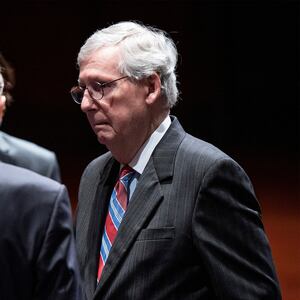When bipartisan majorities in Congress passed a massive bill to invest nearly $300 billion in boosting U.S. high-tech manufacturing, it was a perfect opportunity—at least on paper—for J.D. Vance to amplify his hard-nosed brand of populist America First politics.
The Ohio Senate candidate’s closest ideological allies certainly teed off on the bill: Rep. Marjorie Taylor Greene (R-GA), a key early endorser of Vance’s campaign, cast the CHIPS Act—which she dubbed “America LAST!”—as anathema to the MAGA movement.
“Congress is repulsive,” she fumed on Twitter.
Sen. Rick Scott (R-FL), chairman of Senate Republicans’ campaign arm, said “the massive, pro-China CHIPS Act” was “one of the grossest taxpayer-funded handouts I’ve ever seen.”
The leading Ohio conservative, Rep. Jim Jordan (R-OH), hated the bill, and the House Freedom Caucus he helps to lead issued a statement torching the legislation as loaded with “crony capitalist handouts” and “woke policies.”
Vance helped pioneer this brand of GOP rhetoric decrying “woke” capital and China’s influence—which happen to be the animating concerns of his most important mentor and financial backer, the tech billionaire Peter Thiel.
But when CHIPS legislation passed the U.S. Senate with an unusually balanced 64-33 vote, Vance also sounded like something unusual, at least for him: a politician.
“It is impossible for our modern economy to function without access to high quality computer chips,” he said, in a statement. “With the passage of the CHIPS Act, the Senate took an important step to ensure these products are made in America by American workers.”
For Vance, simple home-state politics may have overridden his America First instincts. Ohio stands to gain perhaps the most from the CHIPS Act, with chipmaker Intel planning to spend $20 billion of the federal investment to establish a new facility in the state.
Vance press secretary Luke Schroeder told The Daily Beast that Vance believed the bill was a net gain for his constituents, and took the opportunity to rehash attacks on “woke capital” and China.
“J.D. remains opposed to woke capital and would have preferred a clean bill that didn’t contain Democrats’ woke activism, but J.D. believes the benefits CHIPS will deliver to Ohio far outweigh its flaws,” Schroeder said in a statement. He argued that the bill “creates a much needed opportunity to bring critical manufacturing back home to Ohio” and reduces the country’s dependence on “Communist China.”
But Vance didn’t exactly shout his initial support from the rooftops. He issued a statement to the press, which he shared with followers on the Twitter account belonging to his campaign’s press office, which has fewer than 13,000 followers. Unlike the statement provided in response to this article, that initial announcement didn’t mention “wokism” or China. Vance’s own Twitter account, which has over 260,000 followers, was silent on the bill.
It also happens that Vance’s opponent, Rep. Tim Ryan (D-OH), is a lead sponsor of the legislation in the House—and has made the bill a centerpiece of his campaign, which has had a strongly populist, anti-China bent from the get-go.
That makes the CHIPS Act doubly complicated for Vance, said David Cohen, a professor of politics at the University of Akron, which is located in Ryan’s political home turf.
“Vance is supporting a bill that Tim Ryan not only voted for, but helped author,” Cohen said. “I fully expect Tim Ryan to take advantage of that fact and to tout his efforts to try and get some investments in this area.”
Ryan himself has been touting the CHIPS bill for months, crisscrossing the state for campaign stops at manufacturing plants and trucking depots to tout the need for supply-chain solutions. He’s referred to it as “one of the greatest economic opportunities we've had in Ohio in [his] lifetime,” and hasn’t shied away from highlighting his role in the negotiations that made passage of the bill possible.
To Ryan, that makes Vance’s support all the more notable.
“The CHIPS Act is the biggest investment in Ohio’s industrial economy in my lifetime, and I’m proud to have fought to see it through. This legislation is going to have such a big impact on our state that the word’s even gotten out to JD Vance’s circles in San Francisco,” Ryan told The Daily Beast in a statement Friday.
Ryan’s win on CHIPS ostensibly bolsters his position in a race where he’s beating expectations. Once considered a battleground state, Ohio has swung red in recent elections, choosing former President Trump by 8.1 points in 2020. But multiple polls have shown Ryan and Vance virtually tied.
The saga of the CHIPS Act is unlikely to make or break Vance’s campaign. But it does appear to be an early lesson in the political education of the author and tech investor turned first-time candidate. Trump’s endorsement put Vance over the top in a competitive primary, but getting to the Senate will entail playing nice with a political establishment that overwhelmingly has supported the CHIPS Act.
And, according to Cohen, the CHIPS issue highlights one of the core tensions of Vance’s rise: reconciling his past as an anti-Trump venture capitalist with his present rhetoric as a MAGA warrior.
“He’s been on the campaign trail trying to sound like Jim Jordan, when in essence, he’s a guy that’s backed by big corporations and venture capitalists,” said Cohen. “Look, it’s a weird campaign.”
The question is if the broader electorate in Ohio will buy Vance’s balancing act—and if his ideological allies will let him off the hook for it.
But those MAGA allies were also split. Establishment officials like Trump’s former National Security Adviser Robert O’Brien and former U.S. Trade Representative Robert Lighthizer, both of whom endorsed Vance, both backed the bill—to the extent that the Biden administration turned to them to help whip Republican votes.
For the opposition, in addition to Greene, Jordan, and Scott, vocal Vance supporter and House conservative leader Rep. Jim Banks (R-IN) tarnished the bill. After the Senate’s bipartisan vote on the bill, House Republicans revolted against it; only 24 ended up voting with 219 House Democrats to advance the bill—243 to 187. Eight of the GOP yes votes were from Ohio.
Banks—a Vance endorser from Indiana, the Rust Belt state adjacent to Ohio—led the GOP pushback in the House as head of the Republican Study Committee.
Ahead of the vote, the RSC released a memo that slammed the “fake so-called ‘China’ bill,” which the committee claimed “seeks to copy China’s failed model of centralized government spending” while foisting “Left Woke Diversity Priorities” on the country. (Those “woke” policies were “a diversity officer at the National Science Foundation,” “a study to support ‘advancing diversity and equity’” in the field of artificial intelligence, “the creation and funding of ‘National STEM Teacher Corps alliances’ at woke universities,” and an Office of STEM Engagement to “advance diversity, equity, and inclusion in STEM.”)
But it was Jordan, a hard “no” vote, who may have best split the difference.
Quizzed about the bill in a recent radio interview, Jordan ticked off a number of reasons he rejected the package, saying at one point that “anyone with common sense knows that’s only going to exacerbate the inflation problem.” He did, however, carve out an exception for his fellow Ohio conservatives, observing that “with Intel coming, there were some from our delegation who supported it.”
Asked whether those Republican colleagues were “economically illiterate,” Jordan was quick to shut down that line of attack.
“I think they saw the benefit for our state, and certainly their part of our state,” he said.











